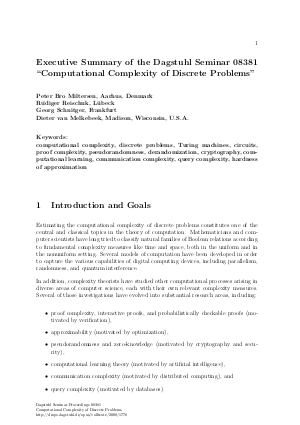08381 Executive Summary – Computational Complexity of Discrete Problems
Authors Peter Bro Miltersen, Rüdiger Reischuk, Georg Schnitger, Dieter van Melkebeek
-
Part of:
Volume:
Dagstuhl Seminar Proceedings, Volume 8381
Part of: Series: Dagstuhl Seminar Proceedings (DagSemProc) - License:
 Creative Commons Attribution 4.0 International license
Creative Commons Attribution 4.0 International license
- Publication Date: 2008-12-11
File

PDF
DagSemProc.08381.2.pdf
- Filesize: 103 kB
- 7 pages
Document Identifiers
Subject Classification
Keywords
- Computational complexity
- discrete problems
- Turing machines
- circuits
- proof complexity
- pseudorandomness
- derandomization
- cryptography
- computational learning
- communication complexity
- query complexity
- hardness of approximation
Metrics
- Access Statistics
-
Total Accesses (updated on a weekly basis)
0Document
0Metadata
Abstract
Estimating the computational complexity of discrete problems constitutes one of the central and classical topics in the theory of computation. Mathematicians and computer scientists have long tried to classify natural families of Boolean relations according to fundamental complexity measures like time and space, both in the uniform and in the nonuniform setting. Several models of computation have been developed in order to capture the various capabilities of digital computing devices, including parallelism, randomness, and quantum interference.
Cite As Get BibTex
Peter Bro Miltersen, Rüdiger Reischuk, Georg Schnitger, and Dieter van Melkebeek. 08381 Executive Summary – Computational Complexity of Discrete Problems. In Computational Complexity of Discrete Problems. Dagstuhl Seminar Proceedings, Volume 8381, pp. 1-7, Schloss Dagstuhl – Leibniz-Zentrum für Informatik (2008)
https://doi.org/10.4230/DagSemProc.08381.2
BibTex
@InProceedings{miltersen_et_al:DagSemProc.08381.2,
author = {Miltersen, Peter Bro and Reischuk, R\"{u}diger and Schnitger, Georg and van Melkebeek, Dieter},
title = {{08381 Executive Summary – Computational Complexity of Discrete Problems}},
booktitle = {Computational Complexity of Discrete Problems},
pages = {1--7},
series = {Dagstuhl Seminar Proceedings (DagSemProc)},
ISSN = {1862-4405},
year = {2008},
volume = {8381},
editor = {Peter Bro Miltersen and R\"{u}diger Reischuk and Georg Schnitger and Dieter van Melkebeek},
publisher = {Schloss Dagstuhl -- Leibniz-Zentrum f{\"u}r Informatik},
address = {Dagstuhl, Germany},
URL = {https://drops.dagstuhl.de/entities/document/10.4230/DagSemProc.08381.2},
URN = {urn:nbn:de:0030-drops-17789},
doi = {10.4230/DagSemProc.08381.2},
annote = {Keywords: Computational complexity, discrete problems, Turing machines, circuits, proof complexity, pseudorandomness, derandomization, cryptography, computational learning, communication complexity, query complexity, hardness of approximation}
}
